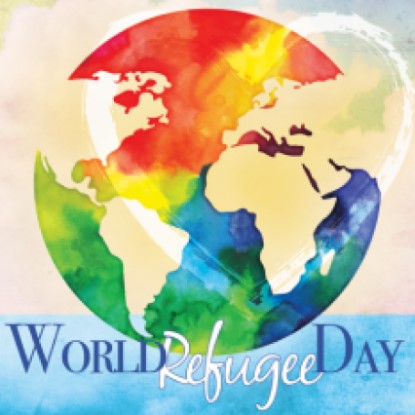What Does it Take to Earn Eternal Life – Dcn. Jerry
September 27, 2019

I grew up in a poor household. Although we were poor my
mother always cooked a little extra and would invite my
friends that had a tougher life to dinner. My grandparents
lived with us and we lived next to the train station in West De
Pere. My grandmother would always have small amounts of
food for the hobo that would come off the train and stop at
our house and ask for food. It was a time before welfare and
people took care of others in need. It was the Catholic Christian
thing to do. Many people have forgotten those values.
Today the Word of God insists in the first reading from the
Prophet Amos that those who have a very comfortable life
and ignore the needs of others will eventually have to live
with the results of that uncaring attitude. The Gospel from
Saint Luke reflects the same teaching: we cannot ignore that
which is in front of us: we must listen to the cry of the poor
and the oppressed.
We are called to respond to the word of the Lord. Saint
Mother Theresa of Calcutta never felt a call to change the
social system but did feel a call to try to help those who were
dying. Other saints and blessed have responded in different
ways and some have tried to change social systems.
We can hear the Lord calling us today to respond in the same
way described in the second reading, from the First Letter to
Timothy: pursue righteousness, devotion, faith, love, patience,
and gentleness.
It is not easy to find how involved we should be with others. It
is obvious that we cannot be involved in everyone else’s life!
Jesus does not give us easy answers. Rather he gives us
stories about a rich man and a poor man. When the rich man
ignores the poor man, he loses his soul.
What is our response to this story of Jesus? How do I love
my neighbor?
Greg Boyle, S.J., who has worked with gang members in Los
Angeles for many years and founded “Homeboy Industries”,
encourages us to step over the abyss and stand skin to skin
next to each other. He says no daylight should separate us,
“only kinship – inching ourselves closer to creating a community
of kinship such that God might recognize it.”
It is that kinship that Jesus is inviting us into. Our world is
too divided and often we isolate ourselves into us and
them. Fr. Boyle’s kinship eliminates the divisions between
us. We are challenged to see Jesus in each other and to
recognize the sacred humanity that we share with every
other person.
I once heard a speaker suggest that we regard each other
with the phrase “one of us.” Like Greg Boyle’s kinship eliminates
the categories in which I so often place people. After
reading about Greg Boyle, I found myself reading or listening
to the news differently and taking part in discussions in a
different way:
One of us was shot on the streets last night. One of us did
the shooting. One of us had our life changed by terrorism.
Some of our children were killed in a school shooting. Some
of us were killed in the bombing. Many of us had no food
today. Thousands of us are homeless.
Today’s readings invite me to look at false boundaries between
us and them. What can I do to reach out to those
who need me? Are there people in my own life or maybe
beyond my daily life that I am being asked to tend to, to feed
or to forgive?
The Scriptures don’t give us an easy answer because there
never is an easy answer to the cry of the poor and the oppressed.
Each of us must take the time to listen to that cry
first and then try to respond to the cry.
World Day of Migrants and Refugees is this Sunday, September
29. This celebration, which has been commemorated
in the Catholic Church around the world since 1914, is an
opportunity to pray for our brothers and sisters who are on
the move due to war, political and social instability, economic
challenges, and environmental crises. We must listen
and respond to this cry for justice through prayer and making
them “one of us.”
On this 26th Sunday in Ordinary Time, we are summoned to
close the artificial gap between us and them, between our
own comfortable lives, and the sisters and brothers who
need us – the ones we don’t always see in pain on our own
doorstep. – Deacon Jerry
